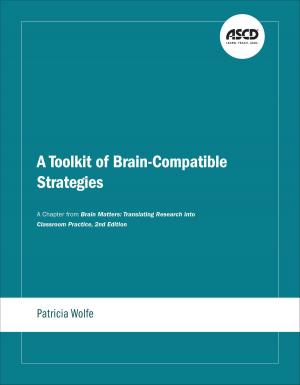The Educator's Guide to Assessing and Improving School Discipline Programs
ASCD
Nonfiction, Reference & Language, Education & Teaching, Counseling & Guidance| Author: | Mark Boynton, Christine Boynton | ISBN: | 9781416616917 |
| Publisher: | ASCD | Publication: | December 15, 2007 |
| Imprint: | ASCD | Language: | English |
| Author: | Mark Boynton, Christine Boynton |
| ISBN: | 9781416616917 |
| Publisher: | ASCD |
| Publication: | December 15, 2007 |
| Imprint: | ASCD |
| Language: | English |
As every educator knows, even the best-performing schools have occasional discipline issues. In The Educator’s Guide to Assessing and Improving School Discipline Programs, Mark and Christine Boynton provide a framework for preventing as many discipline problems as possible—and for dealing with them effectively when they do arise. This framework includes four principal components: positive relationships with students, clearly defined parameters of student behavior, effective monitoring of students, and appropriate consequences for misbehavior. In addition to explaining the rationale for each component, the authors provide * In-depth surveys and interview forms for addressing each component of the discipline program on a schoolwide basis, including separate forms for primary and secondary schools; * Advice on how best to form school discipline committees; * A framework for devising and implementing appropriate interventions when preventive measures aren’t enough; * Guidelines for discussing student misconduct with parents; and * Strategies for working with particularly difficult cases, such as students with oppositional defiant disorder or attention deficit hyperactivity disorder. The best way to maintain a productive learning environment is to have a thorough system of preventive measures in place. Whether you’re creating a new discipline program or hoping to improve an existing one, this book has everything you need to get the job done right.
As every educator knows, even the best-performing schools have occasional discipline issues. In The Educator’s Guide to Assessing and Improving School Discipline Programs, Mark and Christine Boynton provide a framework for preventing as many discipline problems as possible—and for dealing with them effectively when they do arise. This framework includes four principal components: positive relationships with students, clearly defined parameters of student behavior, effective monitoring of students, and appropriate consequences for misbehavior. In addition to explaining the rationale for each component, the authors provide * In-depth surveys and interview forms for addressing each component of the discipline program on a schoolwide basis, including separate forms for primary and secondary schools; * Advice on how best to form school discipline committees; * A framework for devising and implementing appropriate interventions when preventive measures aren’t enough; * Guidelines for discussing student misconduct with parents; and * Strategies for working with particularly difficult cases, such as students with oppositional defiant disorder or attention deficit hyperactivity disorder. The best way to maintain a productive learning environment is to have a thorough system of preventive measures in place. Whether you’re creating a new discipline program or hoping to improve an existing one, this book has everything you need to get the job done right.















